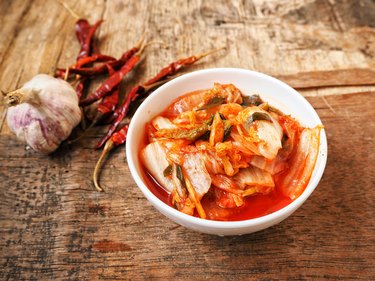
While dairy yogurts can provide essential calcium, protein and probiotics, it's safe to say that not everyone can enjoy these products with ease. Up to 65 percent of the human population is lactose intolerant, according to the U.S. National Library of Medicine. And let's not forget those on a vegan diet.
Thankfully, there are other ways to get those good gut bugs that don't involve venturing to the dairy aisle. Many products (think: nut butters and sauerkraut) contain live and active cultures.
Video of the Day
Video of the Day
"Live and active cultures refer to the living organisms (for example, Lactobacillus bulgaricus and Streptococcus thermophilus, which convert pasteurized milk to yogurt during fermentation)," Gabrielle Mancella, RD, says. "Live cultures are microbes that often work as food-fermentation agents, which feed off the sugar found in products." Lactobacillus bulgaricus and Streptococcus thermophilus are some of the most common strains seen on many food labels, she adds.
However, keep in mind no two strains of probiotics are the same, says dietitian Kristie Leigh, RD, senior manager of scientific affairs at Danone North America. "The benefits of probiotics vary depending on the strain."
These benefits range from general gut health support to immune health support and many others, Leigh explains. "Because the benefits of probiotics are strain-specific, there aren't gut health or immune health benefits that can be attributed to all probiotics."
Now that you have a better understanding of how probiotics work, we rounded up tasty ways to get those dairy-free probiotics.
1. The Cultured Snacking Co. Probiotic Nut Butters
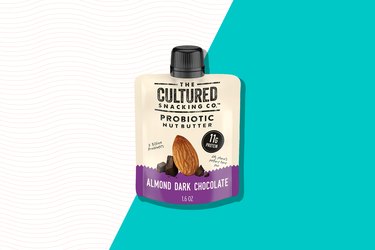
Leigh recommends adding this probiotic-rich nut butter to your shopping cart because each pouch packs a powerful nutritional punch of protein and probiotics. FYI: The snack company adds the same strains of probiotics found in yogurt to their creamy nut butters (since nuts don't have naturally occurring probiotics).
"These nut butters provide probiotics in a delicious, on-the-go nut butter pouch," Leigh says. "They are a convenient source of protein and probiotics with 11 grams of protein and 2 billion probiotics in each pouch."
And while 2 billion probiotics may seem like a lot, Harvard Health Publishing suggests getting 1 billion to 10 billion colony-forming units (CFU), so you'll get a good dose with each squeeze.
- Nutrition facts per serving (1 pouch): 240 calories, 18 grams of fat (3 grams of saturated fat), 65 milligrams of sodium, 15 grams of carbs (4 gram of fiber, 6 grams of sugar), 11 grams of protein
Buy it: Amazon.com; Price: $2.69 per pouch
2. 365 Everyday Value Organic Sauerkraut
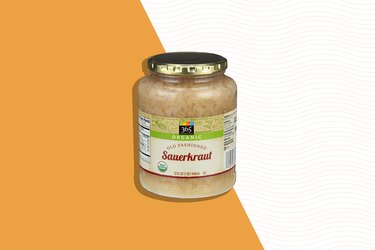
Whether you eat it raw or swap it for relish on your hot dog, Rachel Fine, RD, says sauerkraut is a great source of probiotics. This fermented cabbage product is also loaded with vitamins B and C, and provides a savory kick to your meals.
And while the probiotics inside sauerkraut can help maintain a healthy gut, an August 2012 study published in the Nutrition and Cancer journal suggests sauerkraut has impressive benefits for disease prevention; especially in regards to reducing breast cancer incidences.
- Nutrition facts per serving (2 tablespoons): 5 calories, 0 grams of fat (0 grams of saturated fat), 160 milligrams of sodium, 1 gram of carbs (1 gram of fiber, 0 grams of sugar), 0 grams of protein
Buy it: Amazon.com; Price: $4.19 per jar
Read more: Do Probiotics Expire?
3. Wonder Drink Fermented Kombucha
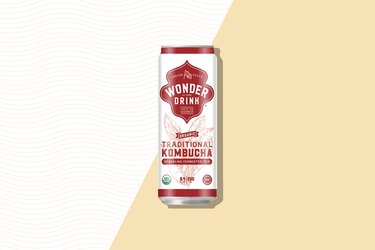
This fermented sparkling drink is one of the only certified-organic kombucha brands on the market that contains a plant-based and prebiotic fiber called xylooligosaccharides (or XOS fiber), says Nicole Avena, PhD, an assistant professor of neuroscience at Mount Sinai School of Medicine.
XOS, according to Avena, is known to selectively nourish certain naturally occurring probiotic bacteria in your gut. And while research on XOS fibers' role in human health is still in its infancy, an August 2016 study published in Gastroenterology Research and Practice suggests that the fiber has positive prebiotic effects linked to balancing the gut bacteria in the intestine.
- Nutrition facts per serving (1 can): 70 calories, 0 grams of fat (0 grams of saturated fat), 10 milligrams of sodium, 15 grams of carbs (0 grams of fiber, 15 grams of sugar), 0 grams of protein
Buy it: Amazon.com; Price: $34.40 per 24-pack
4. Lavva Plant-Based Yogurt
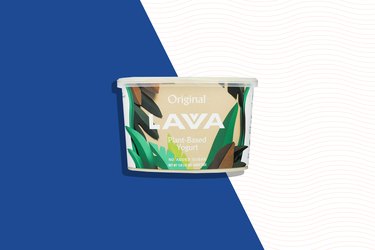
Mancella says this plant-based yogurt alternative is a great way to help maintain your immune system, as it packs in clean ingredients and no sugar. She likes to add nut butter or a little manuka honey on top of her yogurt for a simple breakfast (or a quick snack!) that's full of nutrition.
"This is a plant-based yogurt with no added sugar and contains only coconut water, coconut cream, plantains, pili nuts, coconut powder, cassava root, lime juice, Himalayan salt and live vegan cultures," she explains.
These vegan probiotics include L. Plantarum, S. Thermophilus, L. Bulgaricus, L. Acidophilus, Bifidobacterium Ssp. (B. Bifidum), and L. Rhamnosus and L. Delbrueckii — and some of the strains are linked to GI benefits, according to an April 2017 study published in Integrative Medicine: A Clinician's Journal. When people ate yogurt fermented with Lactobacillus delbrueckii and L. Rhamnosus GR-1, they saw improvement in gastrointestinal issues.
- Nutrition facts per serving (5.3 oz): 170 calories, 13 grams of fat (10 grams of saturated fat), 65 milligrams of sodium, 11 grams of carbs (1 gram of fiber, 7 grams of sugar), 2 grams of protein
Buy it: Amazon.com; Price: $5.53 per 16-ounce container
Read more: The Best-Rated Probiotics
5. Mother in Law’s Kimchi-House Napa Cabbage
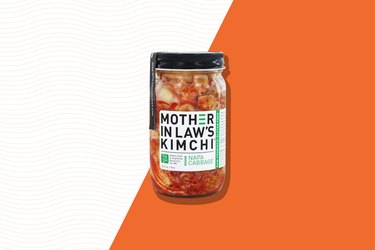
Low in calories and sugar, kimchi is a winner for your taste buds and your health, as it's savory and contains probiotics. "I love this product because it's cold-pressed and organic," Frances Largeman-Roth, RDN, says.
Probiotics aside, kimchi also hosts dietary fiber, minerals, amino acids and vitamins, per an August 2018 study in Food Science and Biotechnology. No matter how you eat it, kimchi is one food that has unlimited recipe potential — it can be used in delicious salads, salsas and as a tasty slaw on top of burgers.
Tip
This pick is flavored with beef bone broth, shrimp and fish sauce so if you're looking for vegan kimchi, go for Madge's Premium Vegan Kimchi.
- Nutrition facts per serving (28g): 10 calories, 0 grams of fat (0 grams of saturated fat), 180 milligrams of sodium, 2 grams of carbs (1 gram of fiber, 0 grams of sugar), 1 gram of protein
Buy it: Amazon.com; Price: $7.99 per jar
6. Harmless Harvest Coconut Yogurt Drink
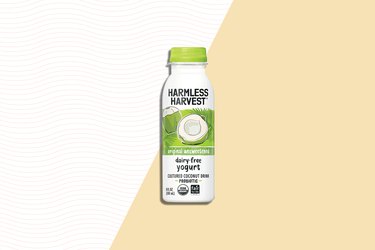
Yogurt in liquid form is one of life's simple pleasures and this probiotic-rich drink delivers delicious coconut flavor right to your taste buds.
"This beverage has the texture of drinkable dairy yogurt, yet it's dairy-free," Amy Gorin, RDN, says. "It's made with Thai coconuts (making it a great source of satiating fiber) and contains up to 10 billion CFU at the time of manufacturing."
- Nutrition facts per serving (1 bottle): 100 calories, 6 grams of fat (4 grams of saturated fat), 20 milligrams of sodium, 12 grams of carbs (3 grams of fiber, 7 grams of sugar), 1 gram of protein
Buy it: Amazon.com; Price: $2.21 per bottle
7. Alive & Well Probiotic-Rich Organic Olives
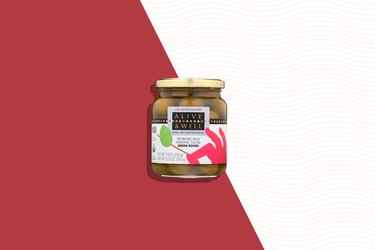
Olives can also be a great source of probiotics, with naturally fermented olive-specific strains showing potential health benefits, per an April 2013 study published in the Food Microbiology journal. With this in mind, Gorin explains that these olives aren't pasteurized — which means their probiotics aren't killed off — so munching on them might help rev up your gut health.
"You get 3.6 million CFUs per serving with these olives and there are 55 million CFUs in an entire jar," Gorin says. "These round, fleshy olives make a great snack, and a serving of three olives is just 20 calories."
- Nutrition facts per serving (3 olives): 20 calories, 2 grams of fat (0.5 grams of saturated fat), 240 milligrams of sodium, 0.5 grams of carbs (0.5 grams of fiber, 0 grams of sugar), 0 grams of protein
Buy it: Amazon.com; Price: $6.53 per jar
- U.S. National Library of Medicine: "Lactose Intolerance"
- Benefit of Probiotics: "Should you take a daily dose of bacteria?"
- Nutrition and Cancer: "Modulation of CYP1A1, CYP1A2 and CYP1B1 expression by cabbage juices and indoles in human breast cell lines"
- Gastroenterology Research and Practice: "Prebiotic Effects of Xylooligosaccharides on the Improvement of Microbiota Balance in Human Subjects"
- Integrative Medicine: A Clinician’s Journal: "Probiotics and Disease: A Comprehensive Summary—Part 4, Infectious Diseases"
- Food Microbiology: "Selection of potential probiotic lactic acid bacteria from fermented olives by in vitro tests"
- Food Science and Biotechnology: "Changes in quality properties of kimchi based on the nitrogen content of fermented anchovy sauce, Myeolchi Aekjeot, during fermentation"